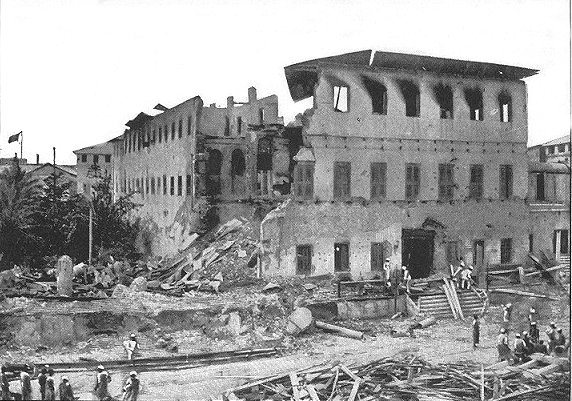 On the 27th August 1896 the shortest war in history was fought between the United Kingdom and Zanzibar. Three days earlier the pro-British Sultan Hamad bin Thuwain died, resulting in a power-struggle in which Hamad bin Thuwain's nephew Khalid bin Bargash took the reigns of power by force, as befitted the custom of the time. While he had widespread support of businessmen and landowners, Khalid did not have the support of the British who preferred a man they felt more amenable to their anti-slavery policy: Hamoud bin Mohamed, a nephew of the former Sultan of Oman.
On the 27th August 1896 the shortest war in history was fought between the United Kingdom and Zanzibar. Three days earlier the pro-British Sultan Hamad bin Thuwain died, resulting in a power-struggle in which Hamad bin Thuwain's nephew Khalid bin Bargash took the reigns of power by force, as befitted the custom of the time. While he had widespread support of businessmen and landowners, Khalid did not have the support of the British who preferred a man they felt more amenable to their anti-slavery policy: Hamoud bin Mohamed, a nephew of the former Sultan of Oman.
After negotiations failed, the British issued an ultimatum to Sultan Khalid bin Bargash, demanding that he give up the throne. When the ultimatum passed on 9.00am, the British commander, General Lloyd Mathew, ordered the hastily assembled fleet of warships to start a bombardment of the royal palace and the Sultan's fleet. Forty minutes later the shelling stopped - the Zanzibarian navy was sunk, the palace was aflame, and the Sultan had fled to the German embassy. In all around five hundred Zanzibarians died in the war, with one British injury.
The following day, Hamud bin Muhammed was crowned Sultan, but was little more than a puppet of the British. Khalid bin Bargash went into hiding, until British troops captured him in Dar es Salaam in 1916. Soon released he lived out the rest of his life in exile.
To read two very different accounts of the war see the BBC website page on 'The Anglo-Zanzibar War of 1896' and the 'Zanzibar Courage' page on the Zanzibar Unveiled site.
Related posts
British capture of Hong Kong, 23rd August 1839
Pink`s War began, 9th March 1925
Tanganyika and Zanzibar unite, 26th April 1964
Customised search for historical information
27 August 2009
On this day in history: The shortest war in history, 1896
Labels:
Africa,
C19th,
Colonialism,
Military,
Politics
Subscribe to:
Post Comments (Atom)















6 comments:
I'm a fan of history. Thanks for this very interesting post!
I think this is a record that will stand forever. Modern wars are more complicated as international negotiation occurs and combatants hide among civilians. It would be nice if we could resolve conflicts as swiftly as that without bombing people.
I love this quote from the BBC article.
"The British, at this stage a comparitively freedom-loving and compassionate world power"
Oh really?
I guess they did what they had to do. Such a shame to destroy such a beautiful structure in the name of war.
Thank you all for the comments.
Steve: In many ways war is more formalised and institutionalised these days. So, I think you may be right.
Emm: The word 'comparatively' is doing a lot of work in that sentence. ;)
Haha! True! Maybe they were comparing them to complete lunatic savages.
Post a Comment